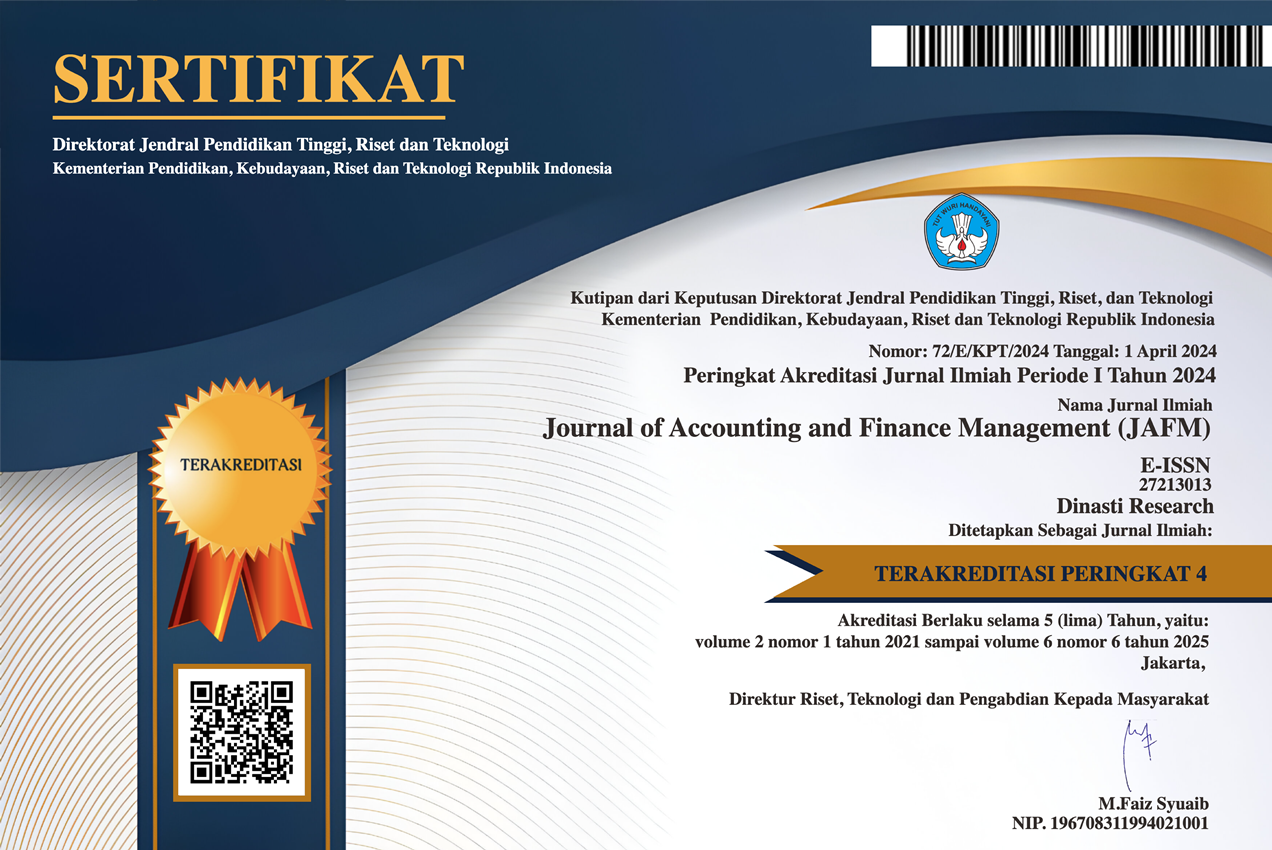Pengaruh Knowledge Management, Talent Management dan Employee Competency Terhadap Employee Performance dan Employee Engangement sebagai Variabel Intervening pada PT. XYZ
DOI:
https://doi.org/10.38035/jafm.v6i3.2247Keywords:
Manajemen Pengetahuan, Pengelolaan Talenta, Kompetensi Karyawan, Keterlibatan Karyawan, Kinerja KaryawanAbstract
Penelitian ini dilatarbelakangi oleh rendahnya efektivitas pengelolaan sumber daya manusia di PT XYZ, Bandung, yang ditandai oleh lemahnya komunikasi internal, terbatasnya peluang pengembangan karier, dan kurangnya penghargaan terhadap kinerja karyawan. Penelitian ini bertujuan untuk menganalisis pengaruh knowledge management, talent management, dan employee competency terhadap employee performance, serta menguji peran employee engagement sebagai variabel mediasi. Penelitian ini menggunakan pendekatan kuantitatif dengan metode deskriptif-verifikatif. Populasi terdiri dari 131 karyawan, yang sekaligus menjadi sampel melalui teknik sampling jenuh. Data dikumpulkan menggunakan kuesioner skala Likert dan dianalisis menggunakan regresi berganda dan uji Sobel. Hasil penelitian menunjukkan bahwa seluruh variabel independen berpengaruh signifikan terhadap employee performance. Knowledge management (p = 0,042), talent management (p = 0,003), dan employee competency (p = 0,010) memberikan kontribusi positif, begitu pula employee engagement (p = 0,016). Uji Sobel menunjukkan bahwa employee engagement memediasi secara signifikan pengaruh ketiga variabel tersebut terhadap employee performance (Z = 2,213; 2,064; 2,126; p < 0,05). Kesimpulannya, peningkatan kinerja karyawan tidak hanya bergantung pada pengelolaan pengetahuan, talenta, dan kompetensi, tetapi juga memerlukan peningkatan keterlibatan karyawan. Disarankan agar perusahaan memperkuat sistem berbagi pengetahuan, pengembangan karier, dan strategi keterlibatan karyawan guna mendorong kinerja optimal secara berkelanjutan.
References
Al-Hussaini, S. H., Turi, J. A., Altamimi, A. N. A., Khan, D. M. A., & Ahmad, M. (2019). Impact of Talent Management Strategies on Employee Performance Behaviour With the Mediating Role of Talent Management Outputs. Archives of Business Research, 7(3). https://doi.org/10.14738/abr.73.6309
Almomani, R. Z. Q., AL-khaldi, S. S. S., Al-Quran, A. Z., Almomani, H. M., Aityassine, F. L. Y., Eldahamsheh, M. M., Al-Shaikh, F. N., Alshurideh, M. T., Mohammad, A. A. S., & Al-Hawary, S. I. S. (2023). The Effect of Talent Management on Organizational Innovation of the Telecommunications Companies in Jordan. Studies in Computational Intelligence, 1056(June), 1779–1794. https://doi.org/10.1007/978-3-031-12382-5_97
Andini, S., & Ekhsan, M. (2024). Maximizing Employee Performance At Pt. Oaj Carton Box: Exploring the Influence of Talent Management, Knowledge Management, and Employee Engagement. Jurnal Muara Ilmu Ekonomi Dan Bisnis, 8(1), 177–190. https://doi.org/10.24912/jmieb.v8i1.29504
Arokiasamy, L., Fujikawa, T., Piaralal, S. K., & Arumugam, T. (2023). Role of HRM Practices in Organization Performance: A Survey Approach. International Journal of Sociotechnology and Knowledge Development, 16(1), 1–32. https://doi.org/10.4018/IJSKD.334555
Bawono, M. W. A., & Arifianto, C. F. (2023). Measuring Employee Performance by Competence and Self-efficacy. TIN: Terapan Informatika Nusantara, 4(3), 178–184. https://doi.org/10.47065/tin.v4i3.4159
Gunawan, M. A., & Gunawan, H. (2019). Compensation, Competence, Organizational Commitment and Its Effect on Employee Performance: Job Satisfaction as Interverning. Journal of Applied Accounting and Taxation, 4(2), 144–149. https://doi.org/10.30871/jaat.v4i2.1595
Hanafi, H. M., & Ibrahim, S. B. (2018). The Impact of Employee Attitude on Service Performance. The International Journal of Humanities & Social Studies, 6(12), 587–598. https://doi.org/10.24940/theijhss/2018/v6/i12/hs1812-013
Musmiarny Nilammadi, W. O., Othy Happy Dharmaning Savitry, & Eni Wuryani. (2024). The Concept Of Human Resource Management In The Life Of Business Organizations In The Digital Era. Sinergi?: Jurnal Ilmiah Ilmu Manajemen, 14(1), 20–28. https://doi.org/10.25139/sng.v14i1.8358
Olusoji, D., & Kevin, M. (2023). TALENT MANAGEMENT AND THE PERFORMANCE OF EMPLOYEES?: A Study of Selected Telecommunication Companies in Delta State. International Journal for Research Trends and Innovation, 8(7), 444–454
Putri Hana Salsafila, Bintang Narpati, Murti Wijayanti, & Tri Yulaeli. (2023). the Influence of Work Discipline, Work Motivation, and Work Environment on Employee Performance. International Journal of Accounting, Management, Economics and Social Sciences (IJAMESC), 1(6), 882–894. https://doi.org/10.61990/ijamesc.v1i6.112
Shuck, B., Adelson, J., & Reio, T.G. (2017). The Employee Engagement Scale: Initial Evidence for Construct Validity and Implications for Theory and Practice: THE EMPLOYEE ENGAGEMENT SCALE. Human Resource Management, 56(6). https://doi.org/10.1002/hrm.21811
Wibowo, D. Y. A., Muljono, P., & Sumertajaya, I. M. (2021). Analysis of the Effect of Knowledge Management, Competency, and Innovation on Employee Performance. Jurnal Aplikasi Manajemen, 19(4), 804–811. https://doi.org/10.21776/ub.jam.2021.019.04.09
Zaki, N., Rathore, D. K., Sial, D. M. A., & Paul, D. Z. I. (2020). UNDERSTANDING THE ROLE PERFORMANCE THROUGH THE LENSES OF TALENT MANAGEMENT AND ITS FACETS. Management Research and Emerging, 10(4), 37–47.
Downloads
Published
How to Cite
Issue
Section
License
Copyright (c) 2025 Nanda Ivana Shinta, Nugraha Saefudin

This work is licensed under a Creative Commons Attribution 4.0 International License.
Authors who publish their manuscripts in this journal agree to the following conditions:
- The copyright on each article belongs to the author(s).
- The author acknowledges that the Journal of Accounting and Finance Management (JAFM) has the right to be the first to publish with a Creative Commons Attribution 4.0 International license (Attribution 4.0 International (CC BY 4.0).
- Authors can submit articles separately, arrange for the non-exclusive distribution of manuscripts that have been published in this journal into other versions (e.g., sent to the author's institutional repository, publication into books, etc.), by acknowledging that the manuscript has been published for the first time in the Journal of Accounting and Finance Management (JAFM).



























